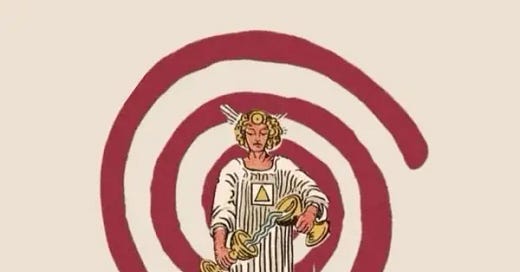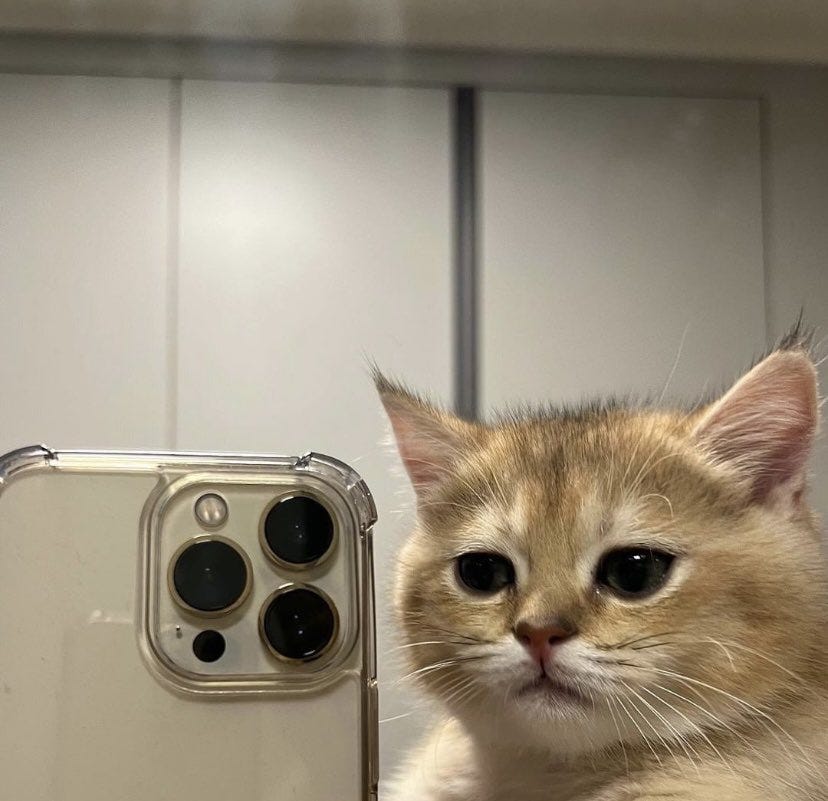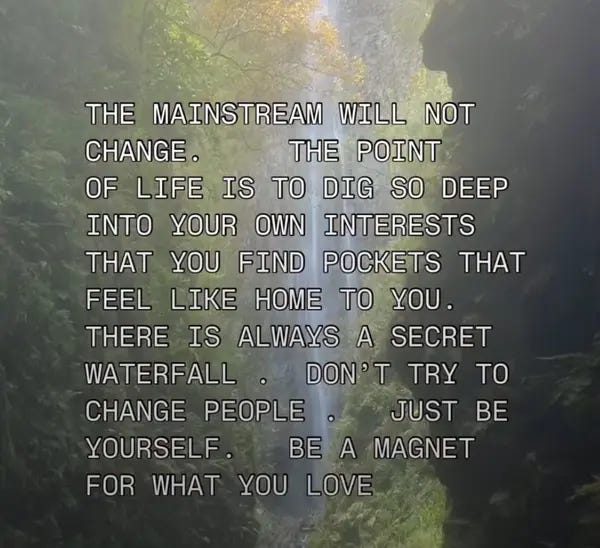Why My Podcast is Called 'Wild Geese'
notes on wonder, mediocrity, and finding the thing that guides your art.
I’ve never fancied myself a tactile artist. Still, I took up painting for a few months in college as a conscious “fuck you” to my art monetization impulses. Getting an expensive acting degree made me resentful to the pressure to be great at everything I did.
At one point, my whole life was about being chosen. Whether it was casting directors, agents, professors, lovers, you name it. I wanted to be great to prove I was allowed to be there. It’s a predicament predictable enough to be flattened into cliche.
This made for some very exciting moments in the room where casting directors made me feel like a once-in-a-generation talent! It also made for a few interactions with agents who thought they were The Messiah among twenty year old hopefuls. Those always left a twist in my gut.
Finding “The Thing” To Guide You Through Mediocrity
I hated myself for my mediocrity. What I didn’t know then - your twenties are the perfect time to be mediocre. Sure, some well-meaning adults had already told me this. But my body didn’t believe it. I had the voices of too many bitter gatekeepers leveling compassionate messages of “fail forward” to the ground.
What I also didn’t realize is this: if shaming yourself for mediocrity feels more irresistible to you than digging through mediocrity to deepen your skill set, you may not have found the thing yet. Friction will exist with any medium and any muse. Finding the thing that makes the work of accepting and pushing through mediocrity generative rather than purely debasing is a worthy pursuit.
By the thing, I’m not talking about talent. I’m not talking about the thing that will make you money. I’m not talking about the thing you will be praised for. I’m not talking about the thing you’re going to change the world with. I’m talking about the thing that will guide you. This is about your life.
Moving through your twenties without a conscious grasp of the thing is okay. Your twenties, mostly, are not made for arrival. They’re for meandering. Getting lost and found and lost and found again. I say, as a twenty-something who swings between the two states on a daily, sometimes hourly basis.
But something really fun to look back on once you have found the thing is that it was actually there with you the whole time. You just hadn’t brought your awareness fully to the thing yet.
Bad Art as Rebellion
I fear I’m getting ahead of myself! I rebelled against the pressure to be great by picking up a paintbrush. Something I had never done with any seriousness. And I wasn’t planning to start now, except that I was serious about being a bad painter.
In third grade, I made a bastardized version of Christina’s World in art class. I was disgusted by the misshapen proportions and unmoved by the dull colors on my canvas. I perceived my classmates finished products as far superior. So I accepted my ineptitude, hung up my apron, and leaned into more natural talents.
Until of course, my natural talents started to feel like a cage of constant comparison.
To my surprise, this stint of “fuck it” painting in college awarded me tangible goodies that I treasure to this day. My room at my parent’s house has a wall full of paintings I finished during Covid lockdown.
I’ve received multiple videos of my baby niece marveling at them during bed time stories. Enchanted and unblinking, she can hardly look away from my monstrosities. My mom even got a tattoo of a blue bonnet painting I made her for Mother’s Day. I cherish the hobby in retrospect, even though I dropped it when life sped up again.
“Are You an Artist?”
Tonight, I’m at a mural painting event in Brooklyn, wearing my new favorite overalls to match the occasion. I feel like I’m back in acting school playing a character. After painting for a while, we sit at long tables with pens and paper to draw and make up games with strangers.
I’m with a man. We answer questions about how we met. I find “how did you two meet?” to be a funny question that I almost never hear when I’m with women. I suspect they can smell the dating app origins on us. We fumble for answers that don’t feel awkward to say out loud.
We ask about what they’re drawing, the craft nights they like to throw together, the books they’re reading right now. A woman asks us if we’re artists.
I immediately feel weird. Because…yes. I have a podcast about creativity. I write, regularly. I sing, habitually. I’m an audio/video editor by trade. I have an acting degree (that I admittedly do not use in any traditional sense). I do consider myself to be an artist. But not necessarily the type that can show off in a classic art studio.
The man I’m with though, points at me without hesitation.
“She is! tell them!”
And I appreciate that he believes in my identity as an artist. But suddenly, I am so incredibly embarrassed that the words “I have a podcast,” are about to come out of my mouth after a question like “are you an artist?”
When Can We Claim Our Creations Are ‘Art’ vs. ‘Content’?
I have a podcast called Wild Geese. The podcast is named after the Mary Oliver poem. The woman asks “what’s the podcast about?” A question that lands like a test I’ve forgotten to study for every single time. All of my marketing abilities fly out the window.
“Um…it’s about…creativity? And…love? And…self-respect? I don’t know, it’s just kind of…whatever I want it to be that week?”
Luckily, the woman knows who Mary Oliver is and the connection serves as a sort of unclench to my social anxiety. But now, I’m so absorbed in my own thoughts, the conversations around me feel like they’re on a different station.
I can’t stop thinking about the next episode of Wild Geese. They tell you to become obsessed with what you’re creating. They don’t tell you that sometimes, that will pluck you out of the room you’re in and land you deep in your thoughts at inopportune moments.
I’m preparing an episode about vulnerability vs. exploitation and the parasocial contract between artists and spectators on the internet. My reluctance to claim the title of “artist” has me thinking about an article by Kate Bugos.
She’s interrogating women’s relationship to their art and the audience’s relationship to women artists. She questions what we value and reinforce in our spectatorship and how it affects our self-concept and changes the nature of our work. Kate asserts:
“The most valuable thing a woman can offer is not her expertise but her vulnerability. Young women are continuously encouraged to put it on display for an audience of hungry internet voyeurs… At 27 how could you possibly be an expert on anything besides going through a breakup or having an eating disorder or looking sexy and forlorn?”
^me, performing for my internet voyeurs
How to Make Art For Yourself, Even with Online Spectators
One of my dads friends came to visit the city recently and said “you know Anna, you don’t have to share everything,” and though he wasn’t referring to my podcast, my mind immediately went there.
After all, I have been candid about my dating experiences, my insecurities, my currently evolving relationship to men and the patriarchy. And I can only guess what’s being said behind my back about my small confessions. For the most part, I couldn’t care less. Especially about what a dad thinks (sorry dads, you’re not my audience).
But something I’ve noticed, when I spot my worries about oversharing and I look under the hood - I am building up an expertise that’s making me proud to be the artist I am. My expertise is wrapped up in my vulnerability. And I don’t think that’s a weak point.
The other night, I went searching through a particular writer's work that I knew would have something interesting to say about this topic. And she did! This might seem like a small thing but I took a moment, after striking gold by finding a full essay written years ago about the topic I’m thinking on now, and I thought holy shit! -
I am now the type of person who knows what authors I want to turn to for each question that comes to mind. I am now the type of person who has an idea for a project or episode, and I know I can and will execute. I know who is writing/has written words I want to be in conversation with. Someone can say something off-hand and I can respond “X has a great piece about this!”
And that is a level of expertise and authority that feels good to step into. And I’m stepping into it through my art. My work on Wild Geese is bringing me closer to the person I want to be, not further away.
I mean damn, I sought out a particular writer’s words because I had a feeling they had something interesting to say about this and then I was proven right. I’ve built up a whole flock of women writers as my guiding lights. And I’ve always had this, but I’ve never felt like I had the language or abilities to join them until I started pushing through the friction publicly.
So this is what I’ve landed on as a barometer to gauge the line between vulnerability and exploitation in my work. It doesn’t really matter what anyone says about what I’m putting out there. Whether they think it’s too much information or not enough, too personal or too impersonal, too cringy or too safe - what I’m making is for ME first. It is generative for me.
Find Your Wonder Before You Find Your Talent
The last thing I want to say - if you haven’t found your medium or your passion yet, that doesn’t make you any less of an artist. I remember feeling like I was fundamentally failing because I didn’t feel the same current of obsession towards show tunes and Shakespeare as my classmates.
I chose acting because I was told I was good at it. I chose painting because I knew I was not good at it. I think maybe this is why “you do not have to be good” is the first line of my favorite poem. You can have an innate talent, but where is your innate wonder?
I’ve been calling on writers my whole entire life. In second grade, when our teacher asked us what our favorite day of the week was, my answer was Thursday because that was the day we went to the library. In seventh grade, Hunger Games took over my dreams and my every waking thought because it showed me a revolutionary woman I wanted to be. In ninth grade, Andrea Gibson’s poetry on Youtube left me sobbing in my room at two A.M.
But I did not grow up saying “I want to be a writer.” I grew up saying “I want to be a pop star or movie star.” Now, for the most part, I couldn’t care less what pop stars and movie stars are doing.
When you find the thing that guides you, you can become a conduit to it. The medium becomes more interesting because you can play with it to fit your needs. You can push through the friction to engage with the thing more fully. Right now, my podcast is helping me engage with the thing that guides me more clearly. Maybe one day, the medium will change. But my thing will still be there, no matter what projects I’m taking on.
When I dipped my toes into embroidery, the first thing I made was a tote bag that said “you only have to let the soft animal of your body love what it loves.” My favorite project in college was the poetry project, in which we made a string of poems into a one person show.
I literally have a podcast named after my favorite poem. And still, I did not recognize poets and women writers as the thing for me until about a week ago.
I think we all have a very hard time seeing what is innate to us, beyond talent. Other people tell you about talent and we are damn near always looking to other people. Sometimes, the thing feels too obvious to be a real answer. But it is a very real answer.






You can have an innate talent, but where is your innate wonder?
I love that ur content is in sync with my life ✨